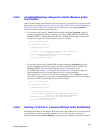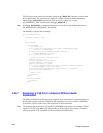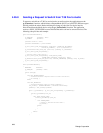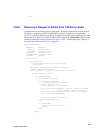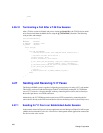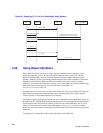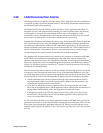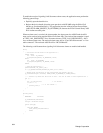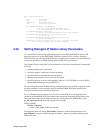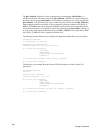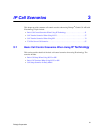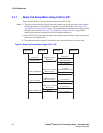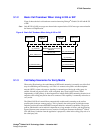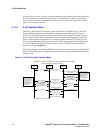333
Dialogic Corporation
4.29 LAN Disconnection Alarms
The Dialogic
®
Global Call API IP Call Control library allows applications to receive notification of
a disruption of traffic over the host network interface. The network disconnection notification uses
the standard GCAMS alarm mechanism.
The Global Call IP Call Control library provides facilities to notify applications when there is a
disruption of a host LAN connection that is handling call control signaling traffic, and when any
such disruption is corrected. The most common cause of such a LAN disruption is cable
disconnection, but any disruption of the LAN connection will cause the alarm to be sent to board
devices that have registered for it. LAN status is monitored on a 4 second loop.
Signaling LAN disconnect (Alarm State ON) and recovery (Alarm State OFF) alarms are generated
on a virtual board device level using the standard GCAMS mechanism. If multiple board devices
are connected to different ports on the same NIC (rather than separate NICs), all of those devices
that have registered for the alarm will receive alarm events when the NIC’s LAN connection fails or
when it is restored after a disconnection. There is a single disconnect alarm event and a single
corresponding recovery event for each LAN disconnection on each virtual board.
The signaling LAN disconnect and recovery alarms are only reported via asynchronous GCAMS
events. There is no mechanism for determining the LAN cable alarm status on demand. The
signaling LAN disconnect alarm is not designated as a blocking or non-blocking GCAMS alarm
because it is a board device level alarm rather than a line device level alarm. Refer to the Dialogic
®
Global Call API Library Reference and Dialogic
®
Global Call API Programming Guide for more
information on GCAMS facilities.
The call control library does not take any action (for example, disconnecting an already set up call)
in response to LAN disconnection alarm events. It is up to the application whether or not to take
any action when alarm events are received. If the application does not take any action when a LAN
disconnect alarm is received, the following behavior applies under the circumstances described:
• Already established calls will not be affected unless the LAN connection that has failed is
carrying the media traffic as well as the signaling traffic. (Media LAN disconnection is not
reported by the signaling LAN disconnect alarm.)
• A call that is in the process of being established will be disconnected by the Call Control
library due to the signaling failure, and the application will be notified of the disconnection via
existing Global Call disconnect events with appropriate disconnection reasons.
• If the application ignores the LAN disconnect error and tries to make a new call over the
disconnected LAN connection, the call will fail and the application will be notified of the
reason via existing Global Call events.
If a LAN disconnection failure occurs during application startup, no GCAMS alarm event will be
generated, because there is no virtual board which is started up to receive the alarm. There will also
be no alarm events generated for applications using the NIC address associated with the system
loopback adapter (typically IP address 127.0.0.1) because the signaling never leaves the system in
this case.



